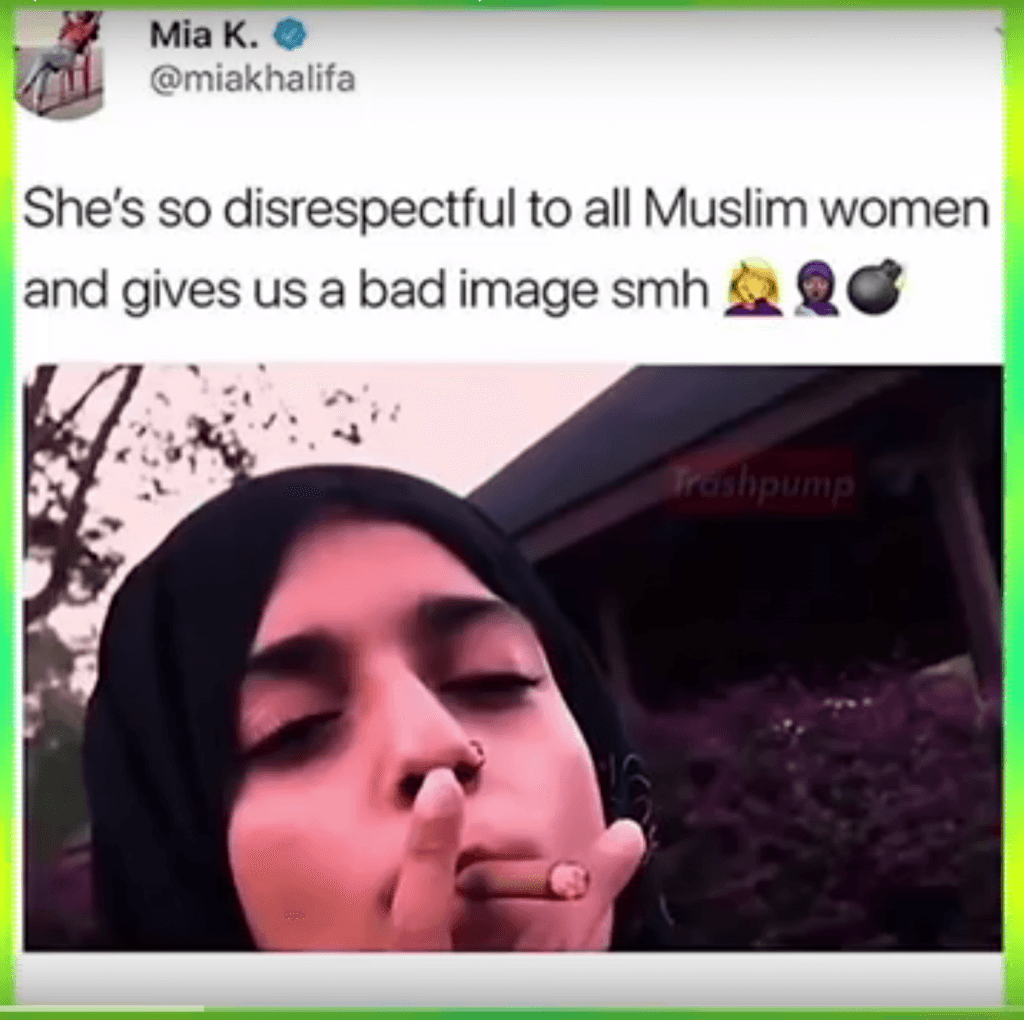Hit or miss
A Semiotic Analysis of the use of the song “Mia Khalifa” on TikTok
By Questen Inghram
Its videos are hitting your Youtube, Instagram, and Twitter feed. Ads for it plague your Snapchat. That’s right, it’s TikTok, the debatable successor to Vine. Users upload 15 to 60 second videos, more often than not accompanied by music or sound which is dubbed over the video. The app hit one billion downloads in February 2019, and that’s not counting android users in China, where the app originated and is known as Douyin (Yeh, 2019). Over half of TikTok users are between the ages of 13 and 24 (Philips, 2018).
Because the app is very music-oriented, having been merged with the similar Musical.ly in 2018, users can search videos by the song used. For this semiotic analysis of social identities users associate with on TikTok, I used videos which use the song “Mia Khalifa” by iLOVEFRiDAY, a diss rap which was made in response to a fake tweet that was photoshopped into looking like it was a hypocritical statement aimed one of the rappers from the Lebanese-American former pornstar Mia Khalifa. Mia Khalifa became a controversial figure after wearing a hijab in a porn video, and the tweet iLOVEFRiDAY was apparently responding to was made to look like Mia Khalifa saying that one of the rappers was disrespectful for smoking in a hijab (Kavner, 2018).
 iLOVEFRiDAY. (2018, March 4). “iLOVEFRiDAY – Mia Khalifa (TIK TOK & ROBLOX ANTHEM) [HIT OR MISS]”. Retrieved from https://www.youtube.com/watch?v=3w-C0-zVaW8%5B/caption%5D
iLOVEFRiDAY. (2018, March 4). “iLOVEFRiDAY – Mia Khalifa (TIK TOK & ROBLOX ANTHEM) [HIT OR MISS]”. Retrieved from https://www.youtube.com/watch?v=3w-C0-zVaW8%5B/caption%5D
This song went viral and became a very popular meme on the app, with over 4.7 million videos using the song as of March 2019. One video in particular by user @nyannyancosplay became viral and became strongly associated with TikTok culture. Many users copy her image, dress and gestures in their videos. The association of the song with the app became even stronger with the #tiktoktest trend, which involves going to a public space (mostly supermarkets and schools) and yelling “Hit or Miss”, a line of “Mia Khalifa” and waiting for a stranger to complete the lyric with “I guess they never miss, huh”, in order to find other TikTokers. Videos with that hashtag have collected over 120 million views.
| White Rationalist. (2018, October 3). “Nyannyan cosplay hit or miss guess they never miss huh- tiktok”. Retrieved from https://www.youtube.com/watch?v=gVEdQJ7qtJw |
When a TikTok user makes a video to the song “Mia Khalifa” there is a twofold meaning-making process going on. The first is with the musician and the creation of the lyrics and music and the meaning they are putting into it. Then, it is interpreted by the TikTok user, who creates yet another layer of meaning-making for their viewer to interpret.
Let’s take a deeper look at the song lyrics:
Hit or miss, I guess they never miss, huh?
You got a boyfriend, bet he doesn’t kiss ya!
He gonna find another girl and he won’t miss ya!
He gonna skrrt and hit the dab like Wiz Khalifa!
(iLOVEFRiDAY)
The first line is about the hypothetical question known as hit or miss (also known as smash or pass), whereby one is to say whether or not they would have sex with a given person. So the implication is that everyone would “hit” the subject of the song… stigmatizing the subject for this perceived sexuality. The next two lines are pretty straightforward––their boyfriend doesn’t find them appealing anymore and they will find someone else. Skrrt, in the last line is in reference to a car driving away and of course, hitting the dab is in reference to the memetic dance move. Wiz Khalifa is a rapper, with no relation to Mia. I could not find anything about whether he dabs often. There is an additional line occasionally included, but for the sake of this project we won’t go there.
Overall, this section of the song which has been used again and again for millions of TikToks is very aggressive and demeaning.
So, how are TikTok users making meaning and forming group identities? That’s where semiotics comes in.
